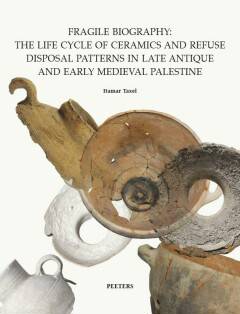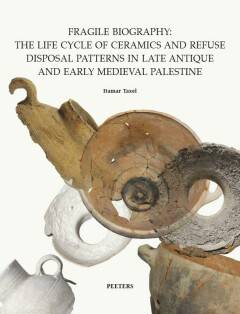
Bedankt voor het vertrouwen het afgelopen jaar! Om jou te bedanken bieden we GRATIS verzending (in België) aan op alles gedurende de hele maand januari.
- Afhalen na 1 uur in een winkel met voorraad
- In januari gratis thuislevering in België
- Ruim aanbod met 7 miljoen producten
Bedankt voor het vertrouwen het afgelopen jaar! Om jou te bedanken bieden we GRATIS verzending (in België) aan op alles gedurende de hele maand januari.
- Afhalen na 1 uur in een winkel met voorraad
- In januari gratis thuislevering in België
- Ruim aanbod met 7 miljoen producten
Zoeken
Fragile Biography
The Life Cycle of Ceramics and Refuse Disposal Patterns in Late Antique and Early Medieval Palestine
I Taxel
€ 82,00
+ 164 punten
Omschrijving
This book is the first comprehensive synthesis of the life cycle of ceramics and of refuse management in ancient Palestine during the later Roman, Byzantine and Early Islamic periods (4th to 11th centuries CE). The study sheds light on selected material culture-related behavioral practices of the people who produced, used and manipulated ceramics during late antique and early medieval times. The research presents the local picture of pottery use--life, including prime use, reuse, repair, recycling and disposal. The reuse, repair and recycling of pottery reflect a plethora of behavioral practices, some common to the greater Mediterranean and Near Eastern world and some unique to the discussed region and periods. Similarly, the discussion of refuse disposal, while using selected case studies, has shown that attitudes towards the residues of people's activity were basically similar in different regions and periods, though the ways in which refuse was managed was often dictated by specific cultural and regional circumstances. Finally, a first attempt has been made in this study to partially unveil the mental rationale behind the above-mentioned practices. The conclusion is that mere pragmatism motivated the rather frequent reuse, repair and recycling of pottery, though it also showed that this tendency became more dominant - in historical Palestine and probably elsewhere - in Late Antiquity and later.
Specificaties
Betrokkenen
- Auteur(s):
- Uitgeverij:
Inhoud
- Aantal bladzijden:
- 203
- Taal:
- Engels
- Reeks:
- Reeksnummer:
- nr. 35
Eigenschappen
- Productcode (EAN):
- 9789042936904
- Verschijningsdatum:
- 6/11/2018
- Uitvoering:
- Paperback
- Formaat:
- Trade paperback (VS)
- Afmetingen:
- 155 mm x 231 mm
- Gewicht:
- 589 g

Alleen bij Standaard Boekhandel
+ 164 punten op je klantenkaart van Standaard Boekhandel
Beoordelingen
We publiceren alleen reviews die voldoen aan de voorwaarden voor reviews. Bekijk onze voorwaarden voor reviews.









